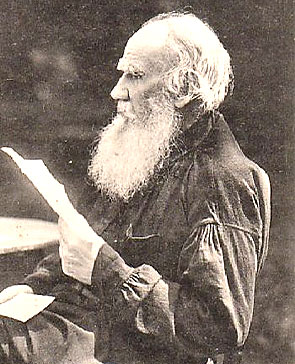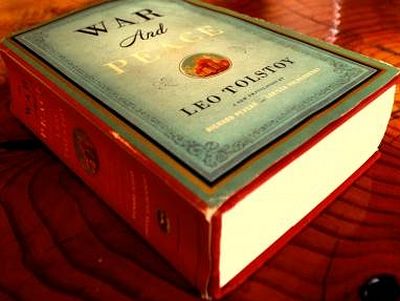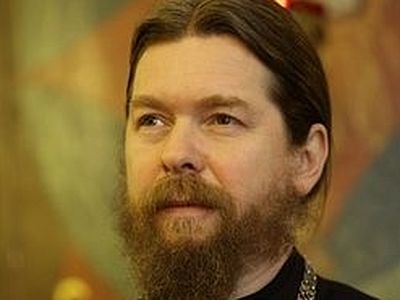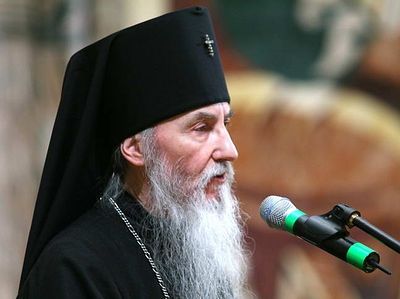
Of course, the journalists could not pass up such a rich theme for polemics during the centennial commemoration of Leo Tolstoy's death. That is why the debate organized on November 23 by RIA Novosti (a Russian news agency) on the theme of Tolstoy went on for three hours. Present were press agents, representatives of Russian bohemian circles, amongst whom were the author's great-great granddaughter, Thecla Tolstaya, and Priest George Orekhanov, the author of two books that studied Leo Tolstoy's works from an unconventional angle.
A contemporary interpreter of Tolstoy's writings, theatrical producer Mikhail Ugarov, tried to set the tone of the discussion. He proclaimed, "Heresies aside, Tolstoy was a major religious thinker whose influence cannot be denied." In his opinion, the Church not only could not forgive Tolstoy, but it cannot repent of that fact. Against all expectation, this argument did not become a catalyst for sharp polemic. Many fans of Tolstoy's works agreed with the dean of the St. Tikhons Humanitarian University, Priest George Orekhanov. The latter related that, "To the attentive reader, several Tolstoys exist: in Chertkov's publication we see the accuser, the struggler against monarchy. Another Tolstoy is the doubter, the truth seeker, and that is the image which the modern reader has yet to rediscover."
It is widely believed that during the critical epoch of the late nineteenth, early twentieth centuries, the Russian intelligentsia quite readily abandoned Christ. In the words of the philosopher Khomyakov, "If freedom of religious confession were granted in Russia, there would be few Orthodox left—the aristocracy would fall for Catholicism, while the peasantry would become Old Believers." The ideologues of communism latched onto that polemical postulate, and speedily announced that faith has lived itself out. Of course, from these positions it is very easy to call Tolstoy the "mirror of the Russian revolution," especially after reading his later works. Nevertheless, only a rare soviet reader would have had access to, for example, Tolstoy's diaries, also written in his later years, but which reveal an entirely different personality in the great author. "The writer was continually plagued with doubts and spiritual searches every moment of his life. In the morning, for example, he could write down a thought, but by evening he would have found thousands of arguments against it. Emotional sleepiness and complacency were things utterly alien to him, while they are so often are a part of our own lives," Fr. George said.
The priest stated that a modern public could no longer be divided into two camps about whether or not Tolstoy left the Church. Unfortunately, the reason is that, "in this post-modern, post-Christian era, man has lost interest in religious problems. Those eternal questions the writer posed on the pages of his books, his spiritual searches, are precisely what could arouse the reader's soul. And that reader would seek answers to these questions in the Gospels and Church tradition."
All those who participated in the debate were unanimous on the point that study of Leo Tolstoy's great literary legacy should in no way be stricken from elementary and high school educational programs. The well-known journalist and Tolstoy's direct descendant, Thecla Tolstaya, emphasized that, "Many officials think that the writers' texts are too complicated for study at the elementary level." In her opinion, some modern schoolchildren are simply not in any condition even to acquaint themselves with these works due to the way they are presented—long "Tolstoyan" sentences are not assimilated by children raised on sms text messages.
Representatives of the Russian Orthodox Church see such a state of affairs as a direct threat to the nation's spirituality. "Where can the young person who does not read the Gospels or attend church services find out about the immortality of the soul? Practically the only source of such information could be the novel, War and Peace. Do you recall the episode where the Frenchmen wanted to shoot Pierre Bezukhov, when the hero asks himself the question: 'Could they really kill my immortal soul?' Upon reading this, a child could begin to ponder his own soul," Fr. George noted.
"The question of whether or not to read Tolstoy, who after the famous Synodal decision stated that he did not consider himself a member of the Orthodox Church, is a personal matter for every Orthodox Christian, but we must remember that even the severe critic of Tolstoyism, Righteous John of Kronstadt, considered Leo Tolstoy a great writer," the dean of St. Tikhon's emphasized. "This is the very tragedy for Orthodox Christians: that the great writer, one of the most famous Russians in the world at that time, ceased to be a member of Christ's Church," he added.
Priest George Orekhanov focused his attention upon the fact that the cultural and religious aspect of Tolstoy should be studied in both secular and religious institutions. In his words, a study of the writer's life and works could aide in understanding the amazing surge of religious seeking that was taking place in Russian society during the 1870's–80's, and which remains largely inexplicable to this day.
Tolstoy should be reopened not only by readers, but also by scholars. For too many years, his creative genius has been presented through the prism of ideology.[1]




